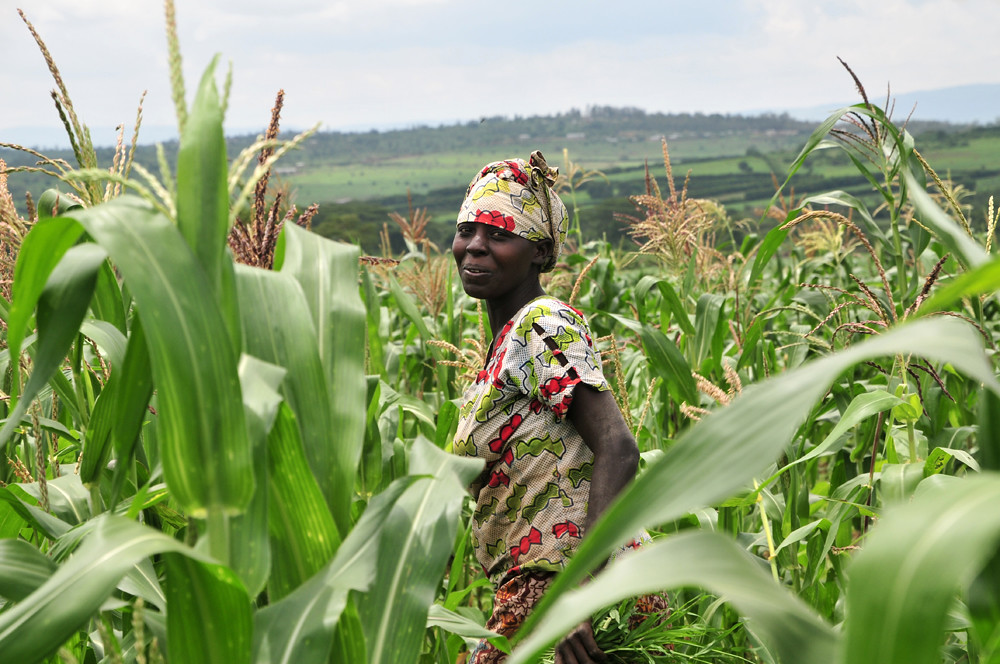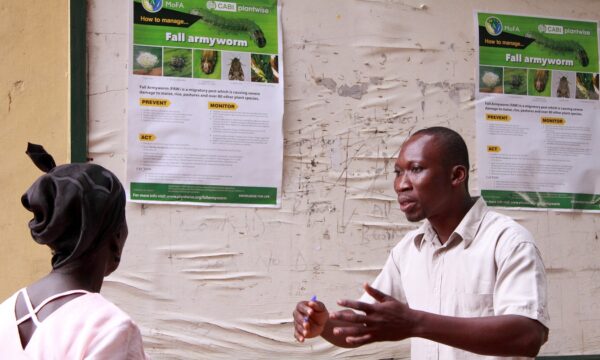Addressing fall armyworm in Eastern Rwanda

We might often have a sense that if taking one course of action works, then doing more of it should amplify that work. It turns out this really is the case regarding agricultural extension.
A PlantwisePlus-funded study has discovered the benefits of ‘multi-channel agricultural extension’. The research focused on smallholder farmers in Eastern Rwanda. It concentrated on how they receive information about the fall armyworm crop pest, Spodoptera frugiperda, via extension.
An interesting discovery in multi-channel agricultural extension
The study revealed an interesting discovery. Receiving messages through any extension channel could yield a 7% increase in knowledge about the pest. However, receiving messages through three channels could yield up to a 23% increase in knowledge. Furthermore, the study surveyed 720 smallholders and found they increased their maize yield between 10% and 34%, depending on the channel.
The study was led by CABI’s Dr Justice Tambo. It included colleagues from the Rwanda Agriculture and Animal Resources Development Board (RAB).
The problem – addressing fall armyworm in Eastern Rwanda
Across Africa, fall armyworm is a big problem. It was first discovered in Rwanda in February 2017. It took only two months for this crop pest to spread to all 30 of the country’s districts. It still causes severe damage to maize crops. And it impacts food insecurity and economic losses.
The fall armyworm threat is significant. Unmanaged, this pest could cause yearly maize production losses of up to USD 4.66 billion. This is in Africa’s 12 maize-producing countries. Smallholders’ go-to’ for addressing the pest has been chemical pesticides.
However, PlantwisePlus has been sharing environmentally friendly and safer ways to manage fall armyworm. Multi-channel agricultural extension has been a critical way of sharing knowledge. This is especially true for smallholder maize farmers. Delivery through various channels has been an important part of the campaigns.
Multi-channel agricultural extension – what are the channels?
The study, published in Food and Energy Security, identifies three extension channels. These include digital extension, plant health rallies and radio dramas.
Over the past 10 years, digital extension has become more popular. And since 2020, the pandemic has only reinforced this trend. Reaching farmers with SMS-based knowledge is essential when face-to-face meetings are not an option. There is no doubt that digital extension can deliver agricultural know-how. It can do this cost-effectively and quickly for smallholder farmers.
However, the report reveals that more significant benefits can be reaped. This is if digital extension is combined with other low-cost, face-to-face extension methods. These include plant health rallies. This is a meeting of extensionists and farmers in a place where farmers come together. It might be in a marketplace, for example. Extensionists hold a meeting or ‘rally’ to answer farmers’ plant health questions.
But combine with this another channel of plant health knowledge – radio dramas. Now you have something even more effective. The dramatizations are like radio plays. They include agricultural knowledge and subtle life lessons that smallholder farmers can adopt. Radio dramas are the most common way that farmers receive fall armyworm knowledge. They are an easy, and entertaining, channel. And they reach into farmers’ communities and homes.
Mixing it up – the multi-channel agricultural extension approach
Dr Tambo and the team found that each channel is effective. But a synergy is created when all three are combined. Multi-channel agricultural extension reveals a number of benefits. Receiving information from different channels helped smallholders identify fall armyworm. And it enabled them to use more environmentally friendly pest management methods.
“Households exposed to the information channels were significantly more likely to regularly monitor their maize fields for fall armyworm, and adopt cultural, chemical, mechanical measures for fall armyworm control than those who did not receive the fall armyworm information,” said Dr Tambo.
“The positive effects of the campaign are statistically significant only when the field-based extension method is combined with digital extension approaches. Moreover, we found that the effects are greater for households that were exposed to all the three channels, suggesting complementary effects of the channels.”
Looking beyond multi-channel agricultural extension
The scientists are now looking beyond fall armyworm management. They want to examine whether multi-channel agricultural extension can also help to promote safe pesticide use. This would mark another step along the journey to enabling smallholder farmers to better manage pests.
Read the full report here.
Full paper reference: Tambo, J. A., Uzayisenga, B., Mugambi, I., Onyango, D. O., & Romney, D. (2022). Sustainable management of fall armyworm in smallholder farming: The role of a multi-channel information campaign in Rwanda. Food and Energy Security, 00, e414. DOI: 10.1002/fes3.414
Read more
Free CABI Academy eLearning courses for extension providers available in Rwanda
Plant clinics improve food security in Rwanda, says new study
Reducing extreme poverty in Rwanda thanks to CABI-led Plantwise plant clinics
1 Comment
Leave a Reply
Related News & Blogs
Empowering women farmers in Ghana: Introducing the gender handbook for extension agents
At 42%, women form a large and important part of the global agricultural work force. In Ghana, this figure is even higher. Here, women make up 52% of the labour force and produce 70% of food crops. However, gender norms and stereotypes often prevent th…
13 September 2024





This was beautiful Admin. Thank you for your reflections.